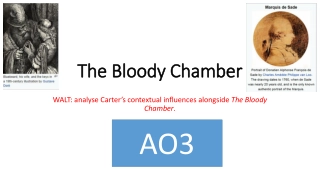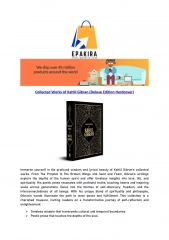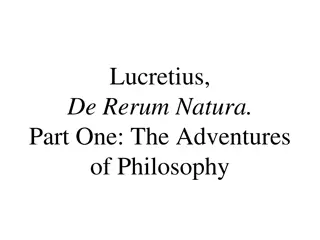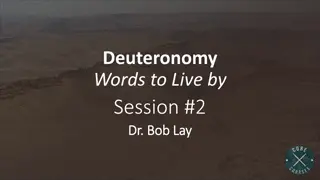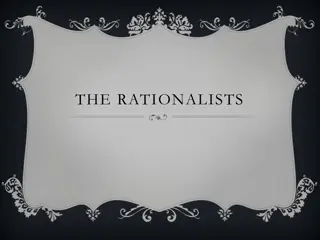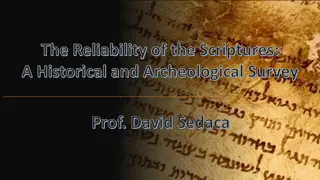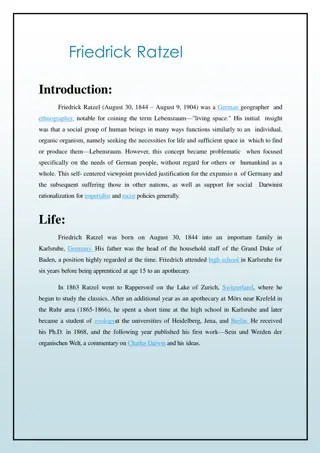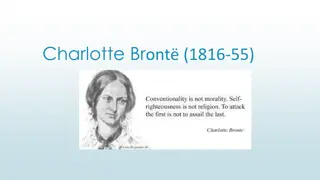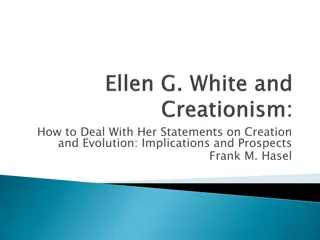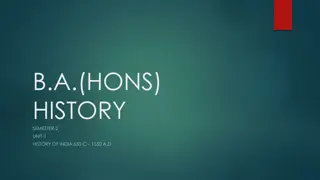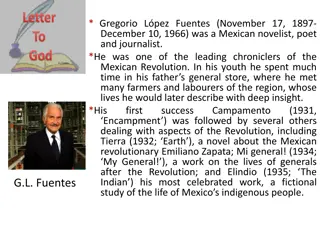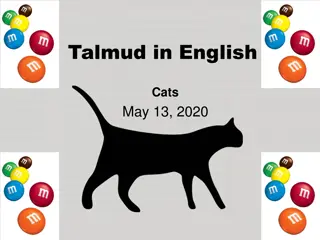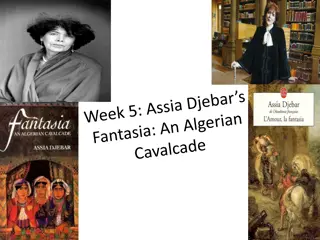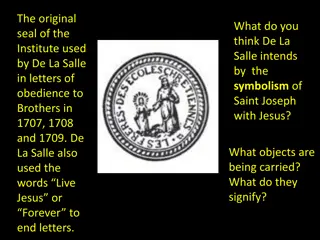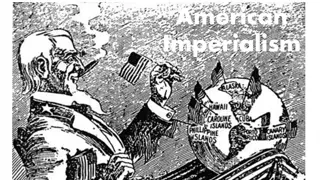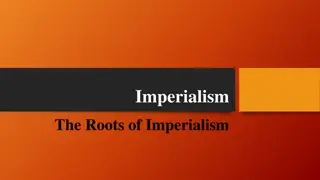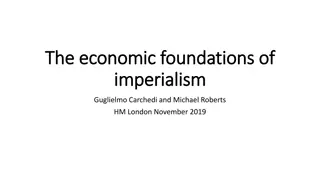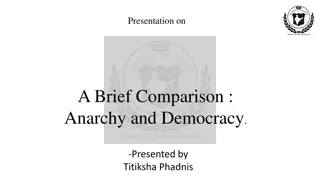Angela Carter and Her Influential Works: A Contextual Analysis
Angela Carter, an English novelist known for her feminist and magical realism works, was influenced by her personal experiences and feminist ideologies. Her notable works include "The Bloody Chamber" and "The Sadeian Woman and the Ideology of Pornography". Carter's unique perspective on women's role
1 views • 26 slides
Collected Works of Kahlil Gibran (Deluxe Edition Hardcover)
Immerse yourself in the profound wisdom and lyrical beauty of Kahlil Gibran\u2019s collected works. From The Prophet to The Broken Wings and Sand and Foam, Gibran\u2019s writings explore the depths of the human spirit and offer timeless insights into love, life, and spirituality. His poetic prose re
2 views • 3 slides
Exploring Horace's Views on Life and Death
Delve into the philosophical musings of Horace, the ancient Roman poet, on topics such as the nature of existence, the inevitability of death, and the pursuit of a fulfilling life despite knowing one's mortality. Discover how Horace's writings reflect his views on living well in the face of uncertai
0 views • 26 slides
Exploring the Book of Psalms: Insights and Guidance for Meaningful Reading
Dive into the depths of the Book of Psalms, a unique collection of inspired writings that cover diverse themes and styles. Discover the richness of this book, written by various authors over different periods, under various circumstances. Gain an understanding of how to approach the Psalms as a sour
4 views • 17 slides
Exploring Lucretius and De Rerum Natura: Philosophy, Poetry, and Materialism
Delve into the life and works of Roman philosopher and poet Lucretius, particularly his masterpiece "De Rerum Natura." Discover the blend of philosophy and poetry, the essence of atomistic materialism, and the themes of explanation, free will, and mortality explored in his writings.
3 views • 24 slides
Understanding Deuteronomy: Moses' Teachings and Biblical Theology
Delve into the profound teachings of Moses as he imparts the importance of obedience and renewal to Israel in the book of Deuteronomy. Explore how this foundational text contributes to the canon of Scripture and influences later historical, prophetic, and poetic writings, along with the teachings of
2 views • 21 slides
Insights into Roman Medicine and Writers of Antiquity
Explore the rich history of Roman medicine and literature through the writings of influential figures like Pliny the Elder. Discover how Roman cures for ailments were associated with treatments such as baths and exercises. Uncover fascinating details about medical practices, including the first phys
0 views • 15 slides
Understanding Rationalism and Self-Made Americans in Historical Context
Rationalism is the belief in arriving at truth through reason rather than authority or intuition. Rationalists view God as a distant creator who doesn't interfere with the universe's workings. They believe in progress towards a better existence and worship by helping others. Meanwhile, self-made Ame
0 views • 9 slides
Understanding the Victorian Era and Charles Dickens through "Bleak House
The Victorian age, marked by significant societal transformations and literary innovations, is epitomized in the works of acclaimed British author Charles Dickens. His novel "Bleak House" vividly portrays the struggles of the Jarndyce family amidst a complex legal battle, reflecting Dickens' critiqu
4 views • 13 slides
Impact of Partition: Saadat Hasan Manto's Literary Contributions
Saadat Hasan Manto, a prominent figure in South Asian literature, deeply explored the human tragedy and trauma caused by the Partition of India in his writings. Despite facing personal challenges, Manto's works like "Toba Tek Singh" continue to be recognized globally for their poignant portrayal of
0 views • 10 slides
Understanding the Historical and Archaeological Aspects of the Scriptures
Delve into the reliability of the Scriptures through a historical and archaeological survey. Explore the origins of the Bible, the concept of the Holy Scriptures, the Canon formation, and the structure of the Hebrew Bible and its various sections like the Torah, Prophets, and Writings.
2 views • 20 slides
Friedrich Ratzel: German Geographer and Ethnographer
Friedrich Ratzel, a prominent German geographer and ethnographer, introduced the concept of Lebensraum, emphasizing the importance of living space for social groups akin to organic organisms. His work was marked by a self-centered viewpoint that rationalized imperialist and racist policies. Ratzel's
0 views • 12 slides
Understanding Gloria Anzaldua and the Borderlands/La Frontera
Gloria Anzaldua, a scholar of Chicana cultural theory and a feminist visionary, explores the concept of new mestizas and a mestiza consciousness in her work "Borderlands/La Frontera: The New Mestiza." She discusses the experiences of individuals inhabiting multiple worlds due to their diverse identi
1 views • 11 slides
Charlotte Brontë: Life, Works, and Legacy
Charlotte Brontë, a pioneering Victorian fiction writer, created heroines reflecting her own character traits while challenging societal norms. Together with her sisters, Elizabeth and Emily, she delved into themes of passion, duty, and individualism in their novels set against the backdrop of the
4 views • 12 slides
European Imperialism in the Late 19th Century
European nations in the late 1800s pursued imperialism to expand their empires for economic, political, and social reasons. Motives included economic interests, political and military ambitions, and the ideology of Social Darwinism. The Industrial Revolution fueled the need for resources and markets
1 views • 14 slides
Dealing with Statements on Creation and Evolution: Implications and Prospects
Understanding Ellen G. White's teachings on creation is crucial for the Seventh-day Adventist Church due to its foundational implications. The doctrine of creation, as affirmed by White and Jesus, affects core beliefs and stands as a defining article of faith for SDA members. While White's writings
1 views • 43 slides
Understanding Marxism: Principles and Theories Explored
Marxism is a theoretical system developed from the writings of Karl Marx, emphasizing historical materialism, dialectical materialism, theory of surplus value, theory of alienation, and more. It posits that societal structures are determined by economic conditions and that progress evolves through d
0 views • 15 slides
Sources of Information in Delhi Sultanate Period
The sources of information in the Delhi Sultanate period include inscriptions found on coins, monuments, and tombstones. Historical writings in Persian language provide valuable insights into the administration and history of the Sultanate. Epigraphs and numismatics also play crucial roles in unders
0 views • 8 slides
Insights into Mexican Novelist Gregorio López Fuentes
Explore the life and works of Gregorio López Fuentes, a prominent Mexican novelist, poet, and journalist known for chronicling the Mexican Revolution. Delve into his impactful writings capturing the essence of Mexican history and culture. Discover his notable literary pieces and the profound themes
0 views • 23 slides
Exploring Jean Jacques Rousseau's Political Philosophy
Jean-Jacques Rousseau, an influential political philosopher, was born in 1712 in Geneva, known for his works that inspired the French Revolution. His diverse talents ranged from writing to music composition. Rousseau's writings, including "The Social Contract" and "Emile," address themes of politica
0 views • 21 slides
Greek Historiographers: Pioneers in Historical Literature
Greek scholars significantly influenced historiography, blending geography and ethnography with historical writings. From Hesiod's mythical accounts to Hecataeus' critical approach and Herodotus' detailed narratives of the Persian Wars, they laid the foundation for the study of history in Greece, em
0 views • 8 slides
English Poets of the 17th and 18th Centuries
Explore the works of prominent English poets from 1660 to 1798, including John Dryden and Alexander Pope. Discover their use of rhymed couplets, satirical writings, translations, and contributions to the Age of Reason in the eighteenth century. Delve into the poetic reflections on nature, life, deat
0 views • 10 slides
Exploring LGBTQ+ History Through Notable Figures and Events
Learn about key figures and events in LGBTQ+ history, such as Bayard Rustin's role in organizing the March on Washington and Sappho's poetry about women loving women. Discover the activism and writings of individuals like the butch lesbian who wrote "Stone Butch Blues" and the famous writer who penn
0 views • 30 slides
Philosophical Reflections on Knowledge and Reality
The content delves into philosophical musings from renowned thinkers like Descartes, Leibniz, and Spinoza, exploring concepts such as innate ideas, geometrical truths, and the nature of philosophy itself. Through their writings, we reflect on the origins of knowledge, the interplay of sensory experi
1 views • 22 slides
Mastering Functional Skills English Level 2: Writing Section Guide
Functional Skills English Level 2 focuses on reading and writing exams, along with a speaking and listening component. This course enhances your comprehension and writing abilities, teaching you to extract meaning from texts and craft your own writings using various techniques. The writing section i
1 views • 32 slides
The Impact of Imperialist Intellectuals on Indian History
Imperialist writings of the 19th century, particularly by intellectuals like Max Muller, J.S. Mill, and William Jones, reflected debates on religious faith, nationality, and economic exploitation. These intellectuals, through their biased interpretations and distorted histories, played a significant
0 views • 11 slides
Exploring Connemara Farms and Sandburg's Legacy
Dive into the world of Connemara Farms and the legacy of the Sandburg family. Visit the picturesque farm, learn about Carl Sandburg's writings, and uncover intriguing details about the family's life. From goats at Connemara to Carl Sandburg's literary works, this journey offers a unique blend of nat
0 views • 28 slides
Insights on Cats in Rabbinic Literature
Explore the various perspectives on cats in Rabbinic literature, ranging from their role in teaching modesty and cleanliness to potential dangers they pose, such as venom. Discover how cats are viewed in Jewish texts, including references from the Tanach, the Talmud, and other ancient writings.
0 views • 20 slides
Voices and Silences: The Writings of Assia Djebar
Assia Djebar's work uncovers the previously silenced voices of Algerian women in resistance against French colonization, weaving together personal experiences, politics, and history. Through her self-identification and use of language, she challenges societal norms and empowers women. Djebar's conce
0 views • 14 slides
Insights into the Life and Writings of an American Universalist Woman
A collection of excerpts revealing the thoughts and experiences of an American Universalist woman from the late 18th century. Touching on themes of fame, curiosity, love, marriage, and personal growth, the content offers a glimpse into her unique perspective on societal norms and relationships, alon
0 views • 16 slides
Symbolism of Saint Joseph with Jesus in De La Salle's Seal
De La Salle's use of the seal, Signum fidei, symbolizes faith with a star on a blue shield. The objects carried by Saint Joseph with Jesus signify guidance, protection, and unity. The imagery reflects the importance of faith and divine guidance in the context of the Institute. De La Salle's writings
1 views • 11 slides
The Epistle of St. Paul the Apostle to Titus: Who is Titus?
Who is Titus according to St. Paul's writings? Titus is described as a loyal disciple and faithful companion of St. Paul. Though not much is known about his life before his missionary work, Titus was a Greek, an uncircumcised Gentile who did not undergo circumcision even when taken to Jerusalem by S
5 views • 23 slides
Orientalism and Imaginative Imperialism in the Arabian Nights
This content discusses the intertwining of Orientalism, imperialism, and literature in works like "A Thousand and One Nights" (The Arabian Nights). It explores how intellectual and cultural energies influenced the imperialist perspective and translation of these texts, revealing deeper insights into
0 views • 8 slides
American Imperialism in the Late 19th Century
Perception of manifest destiny, economic motives, and racial theories drove American expansionism in the 1890s, leading to overseas markets, acquisitions after the Spanish-American War, and debates over imperialism. Key figures, events, and ideologies shaped America's rise as a global power, includi
0 views • 13 slides
Unit Assessment Review: U.S. Imperialism History Lesson
Review session for upcoming history unit assessment on U.S. Imperialism. Topics covered include key events such as the Philippines under American control, reasons for Mark Twain's anti-Imperialist stance, factors driving American foreign policy towards imperialism, the case of Hawaii's Queen Liliuok
0 views • 15 slides
Exploration of American Imperialism Through Historical Events
American imperialism, characterized by extending control over weaker regions for economic and political gain, is exemplified through events like Hawaii's annexation and China's Open Door Policy. The impacts of imperialism on native populations, such as Hawaiians and the Chinese, raise questions abou
0 views • 13 slides
Understanding the Roots and Causes of Imperialism
The roots of imperialism trace back to the late 19th century when the U.S. transitioned to a major global player, acquiring territories and expanding influence beyond its borders. Economic benefits, such as access to raw materials and gaining a competitive edge, drove nations towards imperialism. Th
0 views • 16 slides
US Overseas Expansion in the Late 19th & Early 20th Centuries: Key Concepts & Movements
Explore the reasons behind US overseas expansion in the late 19th and early 20th centuries, including economic opportunities, racial theories, competition with European empires, and the perception that the frontier was closed. Delve into key events, figures, and debates such as the annexation of Haw
0 views • 12 slides
Economic Foundations of Imperialism: Exploitation and Value Transfer
Imperialism primarily functions as an economic mechanism for exploiting value rather than seeking political dominance. The transfer of value occurs through mechanisms like unequal exchange, global value chain flows, and capital flows, leading to the long-term appropriation of value by imperialist na
0 views • 28 slides
A Brief Comparison: Anarchy and Democracy in India
India's transition from anarchy under imperialist rule to democracy post-independence is explored through key legislative acts and reforms implemented over the years. The presentation examines the Regulating Act of 1773, Indian High Courts Act of 1861, and Government of India Acts of 1858, 1919, and
0 views • 15 slides
